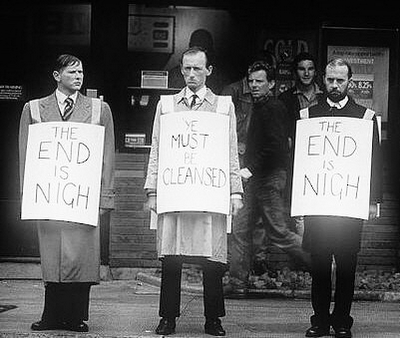Why crying ‘DOOM!’ won’t save the planet

Much debate has been sparked by David Attenborough saying that we shouldn’t be too alarmist about the environment if we want to get people on board. The green movement, predictably, threw their arms in the air, saying we need more warnings, not fewer. But I’m with The Great Whisperer on this one.
It is over 55 years since the first major environmental klaxon, Rachel Carson’s seminal Silent Spring, was sounded. That had an impact because it was out of the blue and had a resonant message – the potential loss of birdsong in spring was a totem which people could get their heads around. In the meantime, we have had one environmental crusade after another yet the general public has been generally loath to start hugging trees and knitting yoghurt.
Why? Because it’s like living next to a busy road – you soon start filtering out the constant background noise. I read the Guardian everyday and, even though I like to think of myself as tuned into social and environmental issues, the paper’s never-ending stream of handwringing over perceived injustices (large and, often, very small) means I often skim headlines for page after page until something interesting catches my eye. I just don’t want to start the day depressed.
Another factor is the intangibility of Sustainability. If you get up every morning to drive a bus or process insurance claims or nurse the injured through A&E, you just don’t see glacier retreat or count the dwindling numbers of rare primates. And people believe what they see, not what they read. (This is one reason why I’m pro-zoo – if you see some cute yellow-breasted capuchins playing and are told there are only 300 left in the wild, it has several orders magnitude bigger an impact than reading the stat on its own). Climate change in particular is bloody complicated and often counterintuitive; not an easy topic for general consumption.
Attenborough’s Blue Planet kick started the War on Plastic because it spent weeks showing us the beauty of the world’s oceans before hitting us with the whammo of the threat of plastic pollution. If it had been six hours of floating plastic bags, tangled turtles and dead petrels, no-one would have watched it. Not even me.
Anyway, the whole idea of ‘we need to get everybody on board for Sustainability’ is a dangerous myth. The plastic bag tax worked by nudging people towards more sustainable choices, rather than beating them over the head with a guilt trip and leaving them to try to work out what to do. It is impossible to make everybody think just like you and me, so we have to work smarter.
My whole Green Jujitsu approach to engaging people in Sustainability is based on thinking like your audience, rather than trying to get them to think like you. And it works. So leave the doom at the door, stop shouting and start listening.

